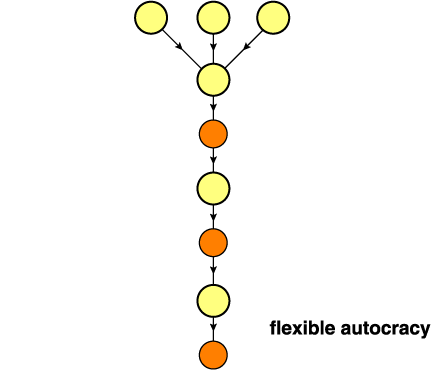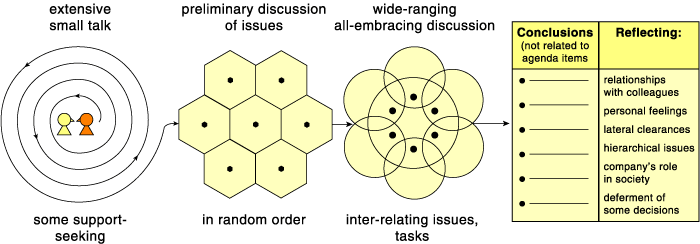Culture: interactionConcept of statusIn the south, status is by birth, title or power. In the bigger industrial cities of the north this still holds true, but wealth and political influence are also important.
Gender issuesThere are many women in professional positions in Italy, particularly in Lombardy and Piedmont, where female educational standards are high. In the south of the country, they opt more for domestic roles, especially in Sicily, Liguria and Calabria. Italian women are generally proud of their role as wife and mother. Most Italian men are mother-oriented and Italian families are very close.
Leadership styleItalian leadership is basically autocratic, but shows more flexibility than some other Latin styles, as managers mingle easily with staff and intersperse themselves at many levels. There are many ‘clan’ and group interests in the southern half of the country and loyalty to the leader is automatic and mandatory. In Milan, Turin and Genoa, there is a growing tendency to select managers on merit. In the north in general, professional competence is valued, though connections remain important. Basically, Italians are comfortable in a hierarchy skilfully led by persons of noble birth or from traditionally eminent or wealthy families. The patronage system is well established in the southern part of the country, especially in Sicily.
 Language of management
Language of managementWhich adjectives best describe the Italian language, known the world over for its pleasing effect on the ear? Soft, fluent, melodious, elegant, aesthetic, musical, pliant, seductive are some that come to mind. These terms indeed reflect the style of Italian managers as they seek to instruct, influence, persuade and perhaps charm their staff to comply with their requirements. Italians are cultured, finicky listeners who would be alienated by authoritarian German, exaggerated, simplified American, cacophonous gobbled Dutch or glottal Danish. They expect to be addressed with elegance and refinement, to be subtly manipulated, perhaps skilfully cajoled, but always in a medium corresponding to their civilised state, sense of aesthetics and acute awareness. The Italian language, spoken by an educated native, can satisfy all these needs.
 Motivation factors
Motivation factors Be human at all times.
Confide in them as much as you dare. This includes revealing family details, hopes, aspirations, disappointments and problems, particulars of past life, education, holidays and so on.
They will reveal much of their private life to you. Listen sympathetically.
Once a certain closeness has been established, maintain it through words and actions.
Enquire always about their family’s health and especially that of older relatives.
Be prepared, in principle, to grant any personal favour they may ask of you.
They must feel that you are in their “group” and they in yours. This involves showing greater loyalty to them than to “outsiders” (outsiders include officials and authorities).
Italians do not always obey the letter of the law. When approaching such issues, you should be as flexible as possible.
Strive to be communicative. There is no advantage in leaving things unsaid with Italians. They rarely see the point of discreet silence, vagueness or ambiguity.
Similarly, British understatement will score no points. You should make your point very clear, though with delicacy.
They are not insulted easily. You can criticize and joke with them. They are not touchy about nationalism.
They misunderstand coded speech, eg.
“Hm, interesting idea.” (stupid)
“We must have a meeting about that.” (forget it)
“We shall certainly consider it.” (we won’t do it)
Better tell them straight, with a laugh in your voice. They will laugh with you.
Be willing to share Italian conspiracies.
There is not a strong correlation in Italy between word and deed. Accept quickly a change of heart or mind on their part. Often they agree to things euphorically, then renege in the cold light of day.
Respect Italy’s strong economy. It is bigger than the UK’s and way ahead of Spain’s. They must be doing something right.
Recall traditional British love of Italian art, food and countryside. Famous Britons such as Keats, Shelley, Tennyson adored Italy.
Appreciate in full Europe’s cultural debt to Italy. (Leonardo, Michelangelo, Rafael, Dante, Mazzini, Galileo, Rossini, Verdi, Caruso, Gigli, Leopardi, etc.)
Contact them often.
General behaviour at meetingsAt meetings, Italians do not follow agendas strictly. They will jump ahead to later points or re-discuss points or thought had already been settled. They will talk loudly, excitedly and at length. Often several people will speak at once and you may find that two or three micro-meetings are happening within the main meeting.
Italians are not touchy and so are difficult to offend. They rarely lose face. Like many East Asians, they may say what they believe the other side wishes to hear. As a result they may under-perform on what they promised. Almost all Italians are optimists and sincerely believe in their ability to perform to the highest standard.
Italian flexibility in business often leads you to think they are ‘dishonest’. They frequently bend rules, break or ‘get round’ some laws and put a very flexible interpretation on certain agreements, controls and regulations. This is the way they do business and you may well be able to benefit from this ‘flexibility’. They will regard any rather rigid, law-abiding approach as somewhat old-fashioned, short-sighted or even blind. In this respect they may be closer to reality than you are and less ideal-bound. They do not consider their approach to be in any way corrupt, immoral or misleading. They will happily take you into their ‘conspiracy’. They will share the ‘benefits’ with you, if you accept. If you stick to the letter of the law, they will go on without you. It is not a question of clear illegalities. There are many grey areas where short cuts are, in Italian eyes, a matter of common sense.
 Negotiating characteristics
Negotiating characteristicsThe Italian is an excellent negotiator, with a style and attitude based on flexibility. Faced with obstacles, non-co-operation or lack of movement, the Italian will rapidly re-package the offer or approach the issue from a fresh angle. They may present things in a very personal way (“look at the good relations between our presidents…”) or become emotional.
Italians are analytical, but subtle in proposals and have great powers of persuasion based on apparent reasonableness and empathy. They rarely walk away from business opportunities, and may accept second-best, if unable to win the main deal. Their starting offers are high, but they are ready to negotiate down to a more realistic level. When selling to them, it is advisable to show them a first price which allows some room for reduction later. They will expect it. They must come away from the deal showing that they have won or gained something. Each member of their team must be granted something. It is best to regard the negotiation as a kind of interesting game, which must be played with many Italian rules, but which leads to a serious and beneficial result (for both).
Contracts and commitmentsIn the northern provinces of Italy, particularly in Milan, Turin and Genova, contracts and commitments are regarded in the same light as they are in neighbouring France or Austria – to be adhered to, with a certain amount of flexibility on both sides. As one goes further south in Italy, this flexibility increases and re-negotiation of agreements is often necessary, especially when one side finds itself in economic difficulties. Work may be carried out late, particularly in the summer months. Deliveries tend to be behind schedule, also payments for good or services received. An EU survey showed Italian companies as being the slowest payers among the 15 member states (averaging more than 90 days). Commitments between individuals who know each other are surer than those made by “faceless” companies.
Manners and taboosItalians are generally easy-going and tolerant people who have few taboos and accept differing manners of foreigners with equanimity. Machismo is, however, endemic, especially in the south and in Sicily. Questions of personal and family honour assume great importance. Throughout the country men can be exceedingly jealous if their wives are approached in too casual a manner. The only real taboo is the one mentioned concerning the protection of female members of the family. Otherwise Italian tolerance is legendary. Criticism of the Church is allowed, also of the political system. Ways of avoiding government regulations and taxes are discussed openly. The “black economy” is a widely recognized phenomenon. Lack of courtesy is, however, frowned upon and a certain delicacy is expected when discussing matters of a personal nature.
How to empathize with themAbove all, be human. Italians are pragmatic and down-to-earth, but they crave understanding and simpatia. The human touch in social and business dealings will generate intense loyalty in an Italian partner. They wish to be telephoned often, visited if possible. They rarely seem to tire of even frequent contact. They are generous hosts and gift-givers and show gratitude when you are willing to be spoiled. Show a strong interest in the incredible richness of their culture. Take time out to visit places of historical or artistic interest with them if they offer such opportunities. Do not rush meals. Do not rely on putting much in writing – it is the spoken word that counts. They are not over-sensitive about their country’s reputation, but it is advisable to be delicate. There is no point in reminding them of Italy’s present confusion in government, relations of corruption and the activities of the Mafia. Their family is their first loyalty and it is a good idea to ask frequently about their welfare.








